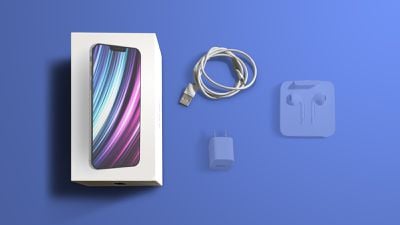Apple Ordered to Stop Selling iPhones Without Charger in Brazil [Updated]
The Justice Ministry in Brazil today ordered Apple to stop selling iPhones without a charger in the box, reports Reuters. Brazilian officials say that Apple is giving customers an incomplete product when the power adapter is not included with the purchase, a move the government claims is a "deliberate discriminatory practice against consumers."

Apple has been fined 12.275 million reais (~$2.34 million) for selling iPhones without chargers, and Brazilian officials are forcing the company to cease offering any iPhone that does not come with a power adapter, including the iPhone 12 and newer.
The Brazilian state of São Paulo previously fined Apple close to $2 million for not providing a charger with modern iPhones, which the São Paulo consumer protection agency said was a violation of Consumer Law Code. Apple also lost a 2022 lawsuit in the country after a customer who did not receive a charger sued.
Apple has told Brazilian officials that not including a power adapter with the iPhone offers environmental benefits and cuts down on waste, but Brazil has thus far rejected this argument.
Apple stopped providing chargers with iPhones starting with the 2020 launch of the iPhone 12 lineup. In most countries, Apple no longer ships iPhones with EarPods or a power adapter, including just a USB-C to Lightning charging cable. Apple says that most customers already have power adapters on hand to charge with, and has told customers that removing these accessories is part of its effort to "reach [its] environmental goals."
The Justice Ministry's order comes one day ahead of Apple's iPhone 14 announcement, which will see the debut of updated iPhone 14 and iPhone 14 Pro models.
Update 1:40 p.m.: In a statement to Bloomberg, Apple says it will appeal the ruling:
"At Apple, we consider our impact on people and the planet in everything we do," the company said in an emailed statement. "Power adapters represented our largest use of zinc and plastic and eliminating them from the box helped cut over 2 million metric tons of carbon emissions -- equivalent to removing 500,000 cars from the road per year." [...]
"We've already won a number of court decisions in Brazil on this topic and are confident our customers are aware of the various options to charge and connect their devices," the Cupertino, California-based company said.
Popular Stories
iOS 19 will not be available on the iPhone XR, iPhone XS, or the iPhone XS Max, according a private account on social media site X that has accurately provided information on device compatibility in the past.
The iPhone XR, iPhone XS, and iPhone XS Max all have an A12 Bionic chip, so it looks like iOS 19 will discontinue support for that chip. All other iPhones that run iOS 18 are expected...
Apple today released iOS 18.4 and iPadOS 18.4, the fourth major updates to the iOS 18 and iPadOS 18 operating system updates that came out last year. iOS 18.4 and iPadOS 18.4 come two months after Apple released iOS 18.3 and iPadOS 18.3.
Subscribe to the MacRumors YouTube channel for more videos.
The new software can be downloaded on eligible iPhones and iPads over-the-air by going to...
Apple today released watchOS 11.4, the fourth major update to the operating system that runs on the Apple Watch. watchOS 11.4 is compatible with the Apple Watch Series 6 and later, all Apple Watch Ultra models, and the Apple Watch SE 2.
watchOS 11.4 can be downloaded on a connected iPhone by opening up the Apple Watch app and going to General > Software Update. To install the new software,...
Apple today released new firmware updates for all AirPods 4 and AirPods Pro 2 models. The new firmware is version 7E93, up from the 7B21 firmware that was installed on the AirPods Pro 2 and the 7B20 firmware available on the AirPods 4 and AirPods 4 with ANC.
It is not immediately clear what new features or changes are included in the new firmware, but we'll update this article should we find ...
Apple today released macOS Sequoia 15.4, the fourth major update to the macOS Sequoia operating system that launched in September. macOS Sequoia 15.4 comes two months after the launch of macOS Sequoia 15.3.
Mac users can download the macOS Sequoia update through the Software Update section of System Settings. It is available for free on all Macs able to run macOS 15.
With...
While the iPhone 17 Pro and iPhone 17 Pro Max are not expected to launch until September, there are already plenty of rumors about the devices.
Below, we recap key changes rumored for the iPhone 17 Pro models as of March 2025:
Aluminum frame: iPhone 17 Pro models are rumored to have an aluminum frame, whereas the iPhone 15 Pro and iPhone 16 Pro models have a titanium frame, and the iPhone ...
Visa wants to pay Apple approximately $100 million to be the new payment network for the Apple Card, reports The Wall Street Journal. As of right now, the Apple Card is on the Mastercard payment network, but that is set to change because Apple is ending its partnership with Goldman Sachs.
Both American Express and Visa are vying to replace Mastercard as Apple's card services provider, while...






















